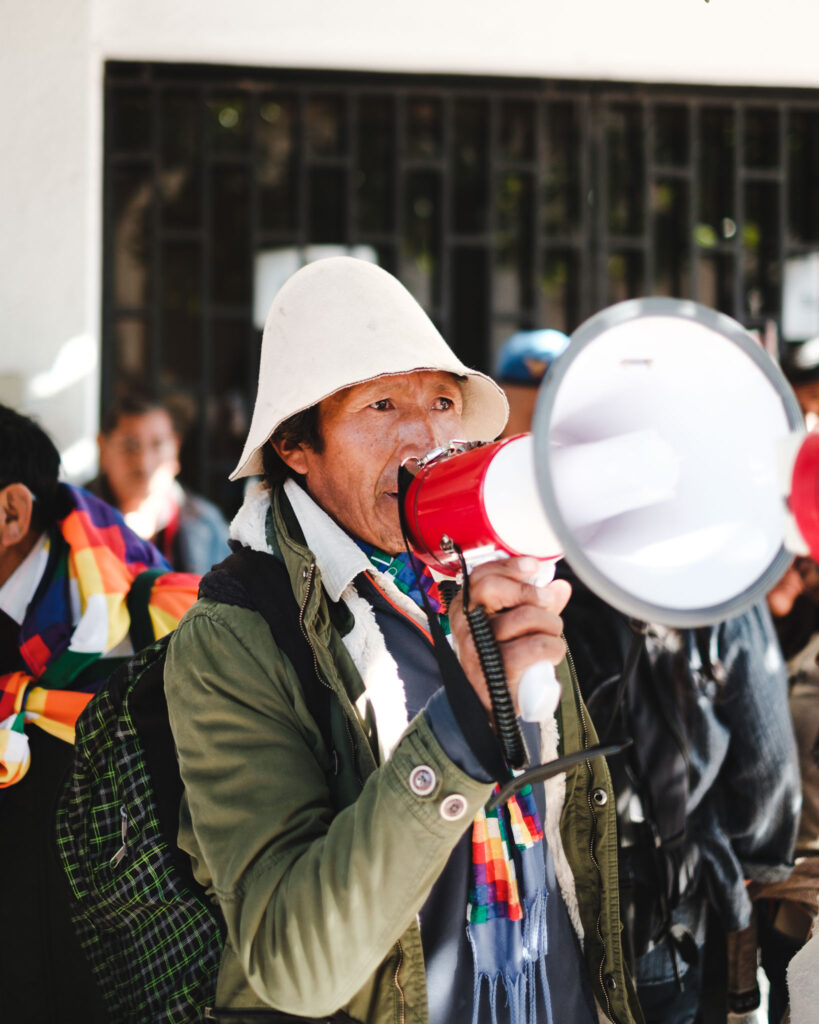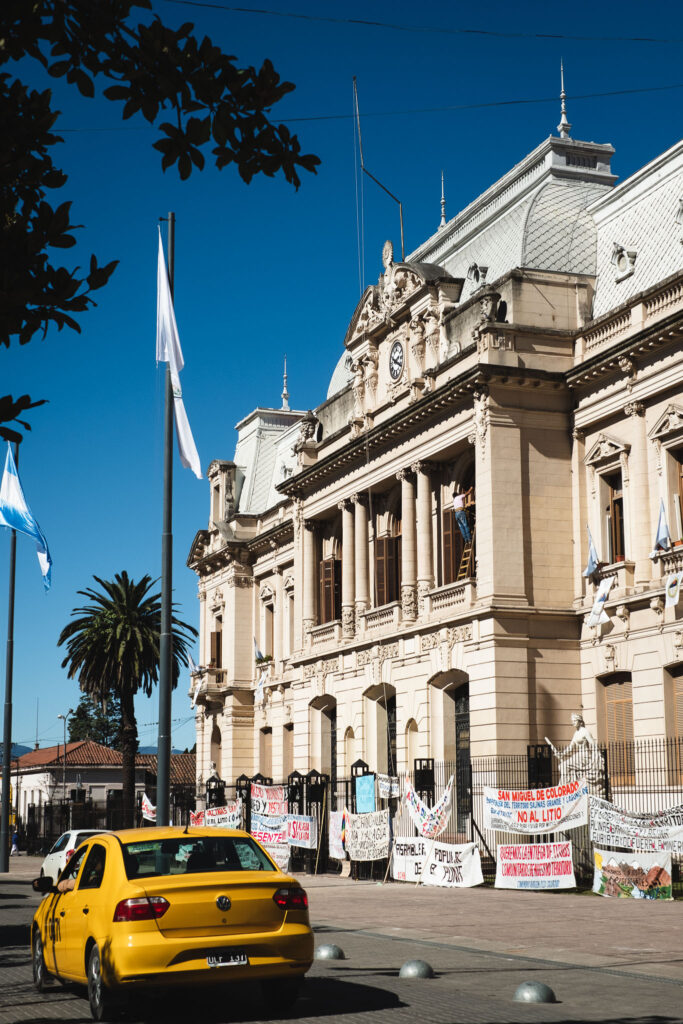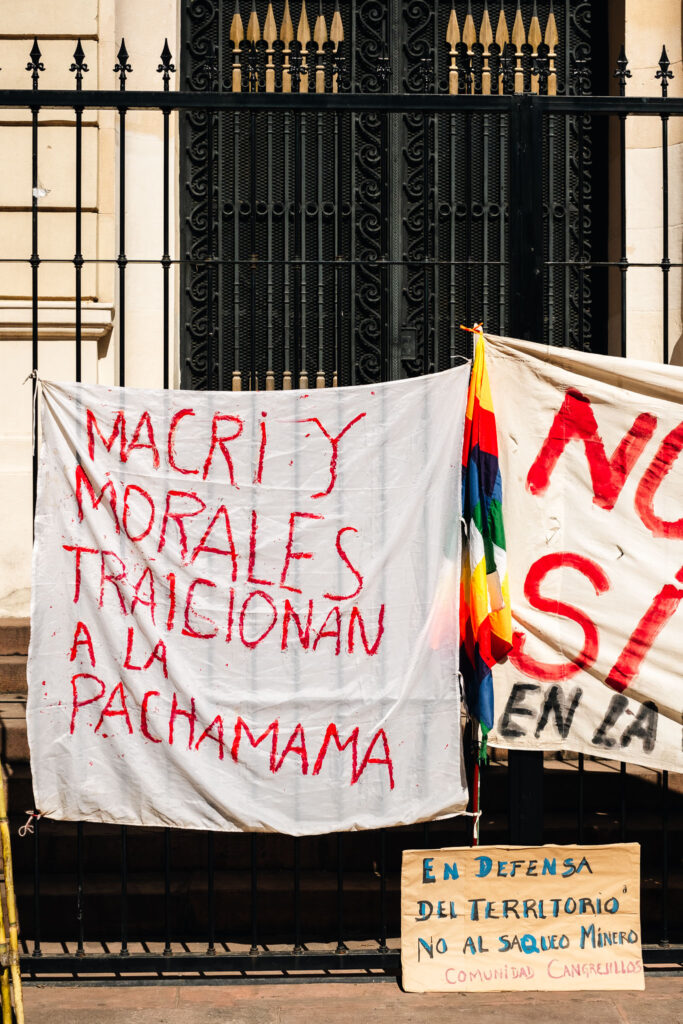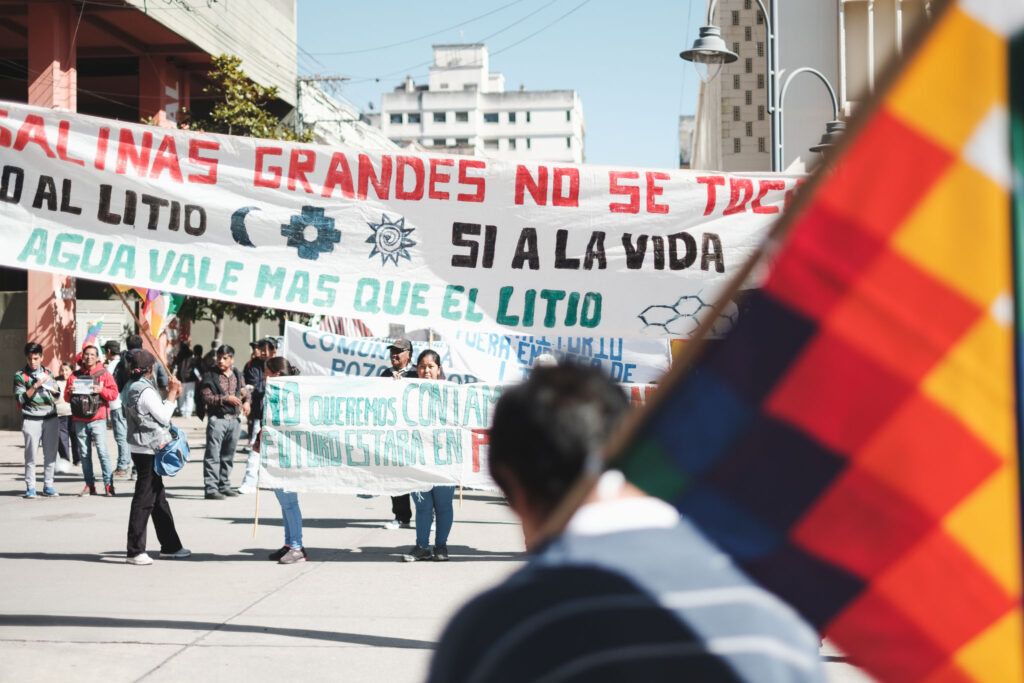“Anyone who opposes lithium mining should stop using a cell phone.”
Gerardo Morales, Governor of Jujuy Province
In the 1990s, far-reaching changes to Argentina’s mining legislation enabled private companies to explore, develop, and exploit mineral resources. The 1994 constitutional reform also made mineral resources a federal issue. For the comparatively poor provinces of northwest Argentina – Jujuy, Salta and Catamarca – mining concessions offered an opportunity. They promised investments and royalties that could improve provincial budgets, create jobs, and strengthen political independence vis-à-vis the national government.
But the new mining legislation also introduced broader changes. On one hand, it opened up Argentina to economic globalization processes (liberalization and flexibilization). On the other hand, it severely restricted the state’s ability to act (deregulation). Minerals that were previously considered “strategic” could now be extracted by private companies . Today, all Salars in northern Argentina are covered with mining concessions. However, there are differences between the provinces. Unlike Salta and Catamarca, Jujuy pursues the goal of a “national vanguard” when it comes to increase the value that lithium creates locally. In this article, I explore discourses of “progress” and “development,” which the provincial government uses to legitimize lithium mining in the region.
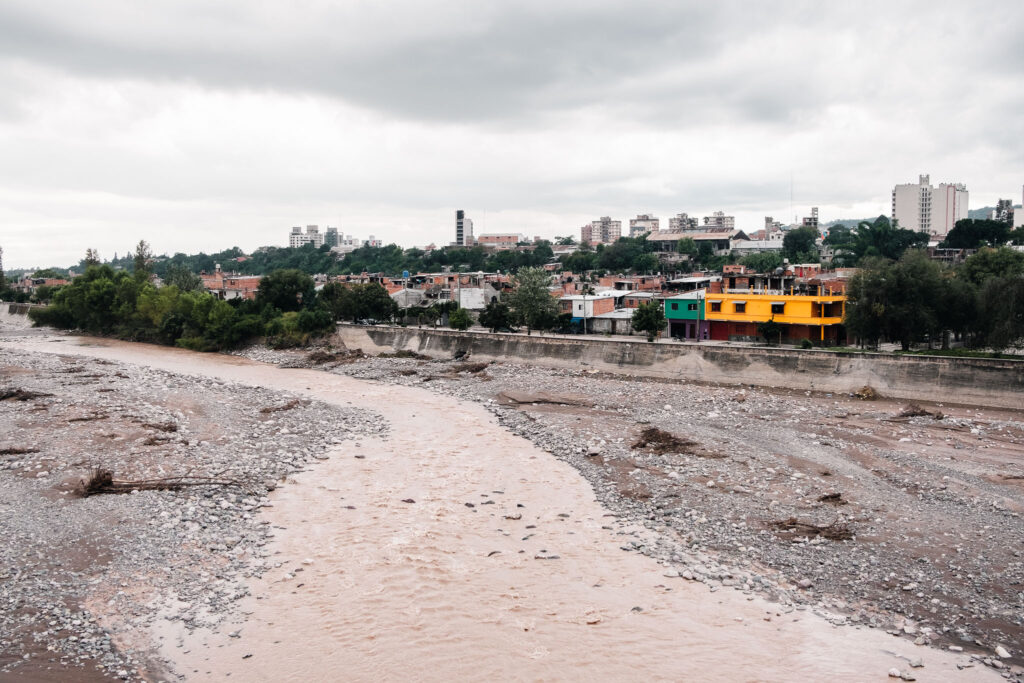
Participation with JEMSE?
In the past decade, there have been numerous political initiatives and projects related to lithium mining in Jujuy. On March 2, 2011, the provincial governor Walter Barrionuevo (in office from 2007 to 2011), issued a decree declaring lithium a strategic resource and promoter of Jujuy’s socio-economic development. A few days later, on March 15, 2011, a second decree created the private-public company Jujuy Energía y Minería Sociedad del Estado (JEMSE). The company’s mission is to promote research, exploration and development in the mining sector. It also seeks to generate renewable energy, and to contribute to a sustainable productive transformation of the province through public-private partnerships. Today, JEMSE has 15 employees in San Salvador de Jujuy and currently holds an 8.5% stake in Sales de Jujuy, a joint venture between Orocobre and Toyota Tsusho. It is poised to sign a contract for another 8.5% stake with Minera Exar, a joint venture between Lithium Americas and Ganfeng Lithium, also .
In 2016, JEMSE won a tender from the Renewable Energy Promotion Program and now manages the 300-megawatt Cauchari Solar Park project in the southeast of Salar de Olaroz-Cauchari. Funded by the Chinese Exim Bank, JEMSE contracted the Chinese firms PowerChina and Shanghai Electric Power Construction to build the approximately 1.18 million solar panels. According to the provincial government, the solar park is not only the largest solar park in South America, but also the highest in the world, located at 4,020 meters above sea level. In addition, JEMSE is responsible for implementing a series of autonomous “solar villages” (9 between 2019 and 2020) in the Puna of Jujuy. The first solar village, which was recently inaugurated in Olaroz Chico, is located close to Jujuy’s first lithium mining project, demonstrating the connections between mining and renewable energy.
The Mining Division Manager at JEMSE admits that the company is currently very busy with the Cauchari project as well as the nine photovoltaic plants. Although she considers developing and promoting further mining exploration a main objective, the company currently lacks room for maneuver in the field of lithium extraction. To maintain its 8.5% stake in Sales de Jujuy, JEMSE borrowed from the owners Orocobre and Toyota Tsusho. The proportionate profit is now used to pay off the debts. JEMSE also has no voice in decision-making processes, and the private partner companies consider its participation voluntary. According to the Division Manager, JEMSE’s participation in the joint venture does not have any advantages for the partner companies, except for being a welcome asset on the stock exchange.
Industrialization, value creation and Jujuy Energía Viva
In 2017, the “General Savio” Technology Development Center was opened in Palpalá. Next to two other institutes it also includes the Center for Research and Development of Advanced Materials and Energy Storage. Mainly known to the public as the “Lithium Institute”, it is a joint project between CONICET, the National University of Jujuy and the Provincial Secretariat of Science and Technology, headed by Victoria Flexer. Its goal is to develop knowledge and technologies for lithium exploration, mining and industrialization. Some CONICET employees reported an apparent underfunding of the institute, others even described it as “empty”.
Besides developing new technologies for lithium extraction from salt flats, key research and development areas include studying cathode processes and developing high-performance batteries. In a second phase, the project includes the construction of a lithium pilot plant.
In December 2017, the government presented the province’s new slogan “Jujuy Energía Viva”. According to Governor Morales, the campaign is not only aimed at the tourist market, but also seeks to promote production and investment.
In May 2019, JEMSE announced that it would build South America’s first Li-ion battery factory, locaed in the Perico Industrial Park and in collaboration with the Italian group Seri Industrial S.p.A. The announcement generated significant national media interest. Implemented by the locally operating company Jujuy Litio (JEMSE 40%, Seri 60%), the project will include a pilot plant for lithium battery assembly and cell production. These are based on lithium materials extracted in the Salars of Jujuy province “under sustainable and environmentally friendly standards”. In a final phase, it will also include the production of electrodes. According to Governor Gerardo Morales (in office since 2015, re-elected in June 2019), the project will lay the foundation for the province’s energy sovereignty and to increase the value created locally by the lithium industry.
Other initiatives and events could be included in this list. For example, the “Mesa de competitividad del litio” took place in March 2019, where President Macri and the provincial governments of Salta and Catamarca discussed measures to promote the lithium sector. With the aforementioned projects, the provincial government tries to emphasize its future-oriented perspective and the importance of the value creation linked to the lithium industry. In a report on the economic impact of the mining sector, jobs and investments in the lithium industry are highlighted in particular. Between 2018 and 2022, total of US$1.2 billion is to be invested in all lithium projects across the province.
However, the mining secretary of Jujuy province himself considers it a very difficult task to further industrialize lithium within Jujuy or Argentina. He draws a comparison with the automotive industry: Even the automobile companies would not produce everything themselves, but would instead depend on supplier companies. The mining secretary states that this kind of industrial ecosystem does not yet exist neither in the province nor in Argentina. The province would urgently need international industrial partners. He does not see any problems with regard to ecological impacts or prior consultation with indigenous communities. Although he emphasizes the need to improve communication with communities, he cannot make out an alternative development idea emerging from indigenous communities: “Mining pollutes the environment to the same extent as agriculture, tourism or any other human activity. The question is, what is their alternative to development? Ask them. And if they tell you they are against lithium mining, also ask ‘And how do you make your money?'”
Digital, green, progressive: just a discourse?
The Morales government has declared to change the province’s production and energy matrix. It considers that investment in lithium and renewable energies are essential for Jujuy’s economic development. In this context, the projects, initiatives and events presented above can be seen as materialized discourses of progress, promoted by the provincial government. Thus, these discourses include both a symbolic and a material dimension.
For example, the Technology Development Center “General Savio” refers by name to the Argentine general and engineer Manuel Nicolás Aristóbulo Savio (1893-1948). Known for his contributions to the development of a national steel industry under President Ortiz, he drafted a law establishing the DGFM in 1941. Serving as its director, the following years he established several iron and armament plants throughout Argentina. After the approval of the national steel plan drafted by Savio – better known as the “Plan Savio” – the state steel company Sociedad Mixta Siderúrgica Argentina (SOMISA) was founded under President Perón in 1947. Savio became its first president. Against this background, the Jujuy province uses the industrialization nimbus of Manuel Savio to name the technology development center and underline the ambitious goals of the three institutes.
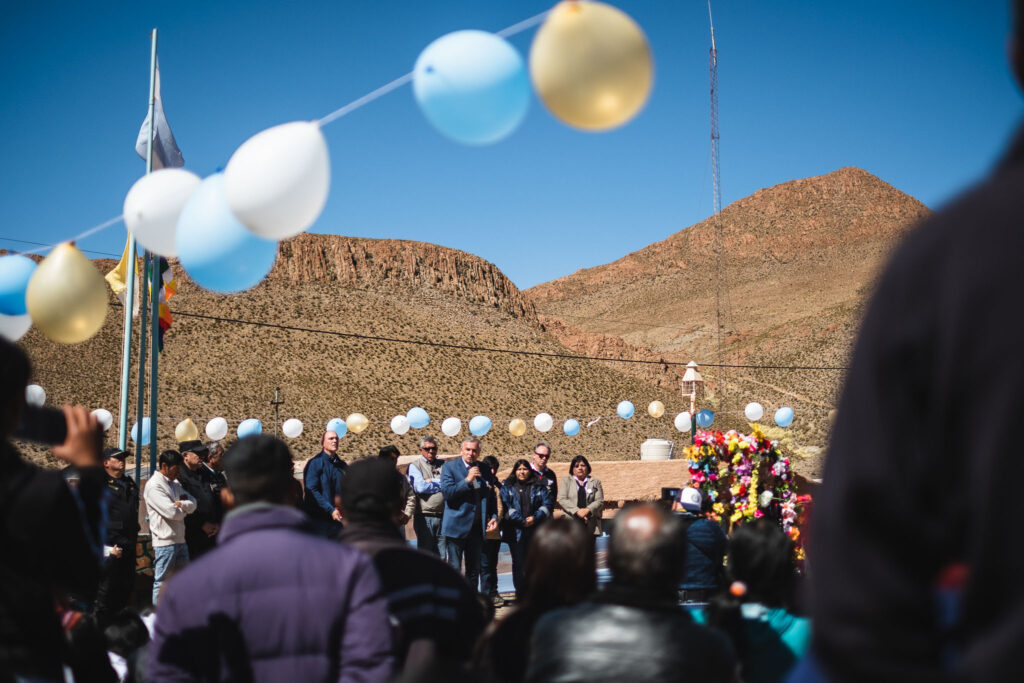
In this example, the symbolic dimension in the form of naming is strongly intertwined with the material dimension of the built environment. In many examples, this intertwining between symbolic and material dimensions is less obvious, as is the case with the provincial slogan “Jujuy Energía Viva” and the construction of a debt-financed solar park. Ultimately, all examples are material manifestations of a discourse.
The global discourses of a sustainability transition and ecological modernization are thus reproduced at provincial level and used by the government for its own goals: The links between lithium, renewable energy and battery production within the province are by no means natural, but made in countless government documents and government speeches. For example, while visiting the Huancar community to celebrate its local patron saint on May 1, 2019, Morales emphasized the importance of lithium mining and the Cauchari Solar Park for a clean planet. On this occasion, he also made a connection between the local llama shepherds, the “green” electricity network and a fiber optic connection for the village. Morales defended the necessity of lithium mining, while presenting himself as a future-oriented visionary.
PhD in geography & heterodox economist, works on the global political economy of decarbonization, especially lithium and hydrogen. Strong focus on global production networks, human-environment relations and photography.
